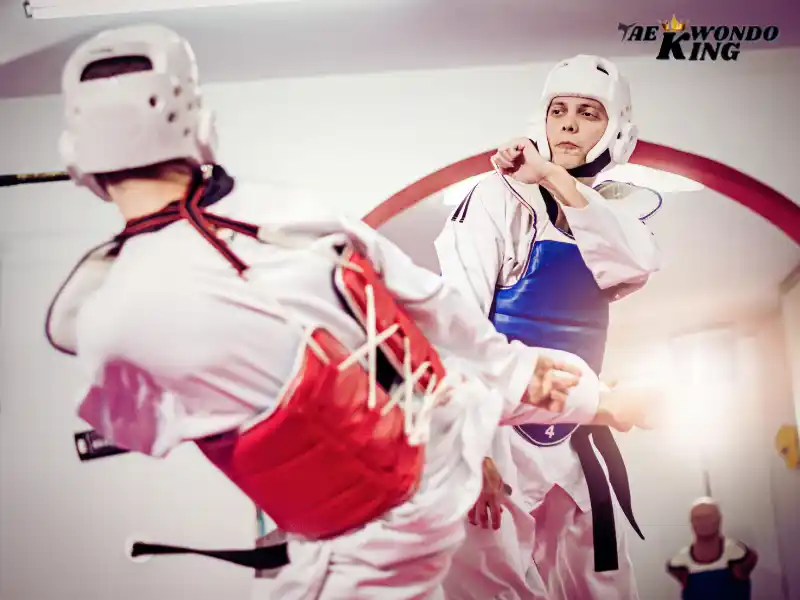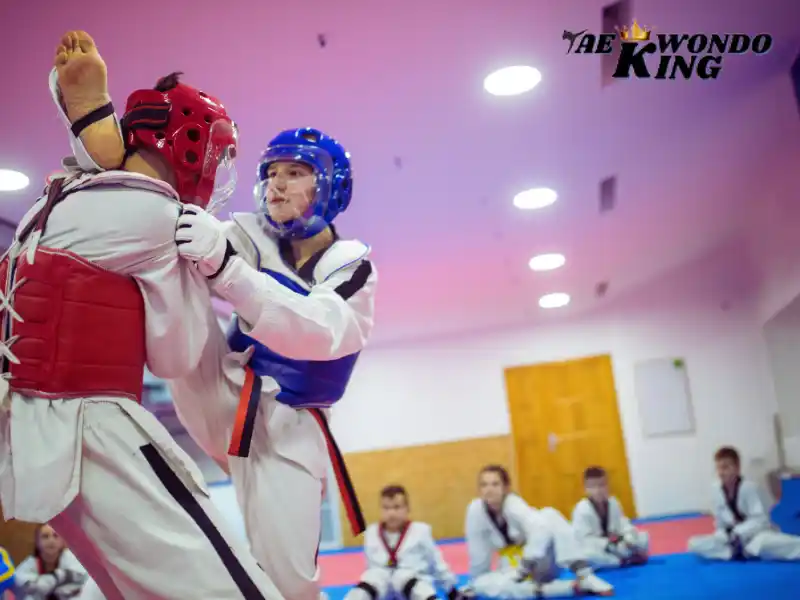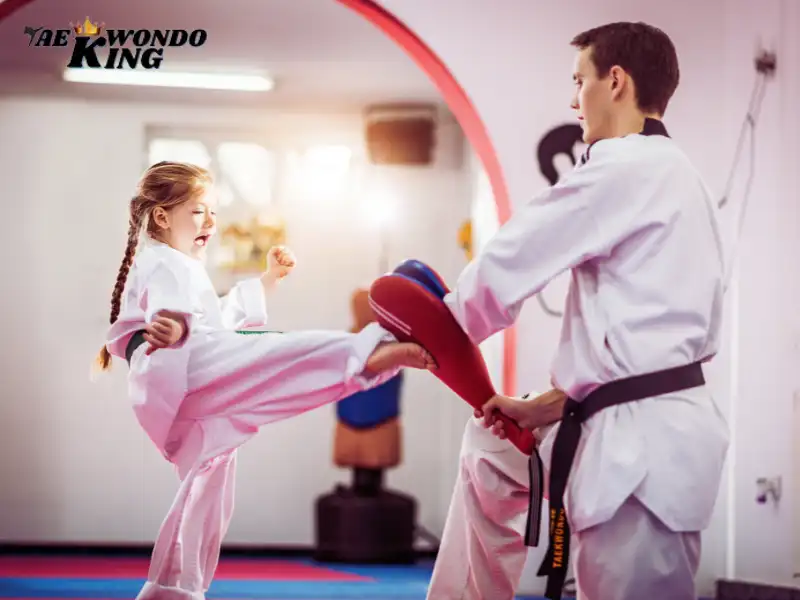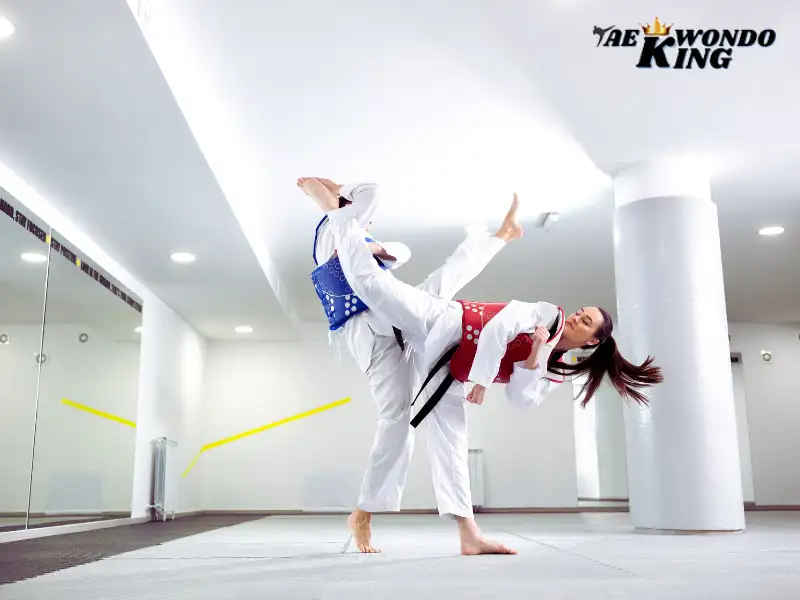
Taekwondo is one of those martial arts that seems extremely difficult to master. But if you know why, this is the case, you’ll be able to put that knowledge to work in order to become a better taekwondo student. If you’re a beginner, looking to learn Taekwondo, there are some good reasons why this may not be the easiest thing to do.
Taekwondo is based on a martial art form, meaning it’s an intense physical activity. This is one reason that Taekwondo can be extremely difficult to learn. As someone who was once in the same position, I understand how frustrating it can be when you’re starting out and you’re unable to understand why you’re failing to perform certain movements.
You’re probably looking for a good reason taekwondo isn’t easy to learn, right? I mean, it takes at least a year or two of training to master. In fact, some people claim that it takes even longer than that.
But if you really think about it, there are plenty of reasons why it can be challenging for beginners to learn taekwondo. For example, most people don’t realize that learning taekwondo requires much more than just the physical discipline it requires.
It’s actually quite easy to get in the mindset that you’re just going to spend months or even years on the mat before you start seeing tangible benefits from your efforts. To help combat this mindset, let’s look at 10 reasons why taekwondo is difficult to learn:
Taekwondo is Hard to Learn
There is a common misconception that Taekwondo is difficult to learn. It’s actually the opposite. Taekwondo is difficult to master because Taekwondo is hard to learn. It takes years to become a true black belt in Taekwondo. Learning Taekwondo is about learning how to learn. You can’t just watch videos or listen to someone else teach it. It is a discipline.
If there is a lot of repetition in the learning process, a learner has a greater chance of retaining that knowledge. This is why Taekwondo is a sport that has a lot of repetition in its curriculum.
Taekwondo is hard to learn because it is physically demanding and mentally challenging. Taekwondo requires mental discipline and physical strength. Because of this, many people fail to see the beauty and value of taekwondo.
I have trained with some of the greatest masters and martial artists in the world, but I still failed to master the art. One reason I struggled to learn taekwondo is that I never gave myself the opportunity to learn the art. I was always too busy working or studying.
Taekwondo Is too physical.

You may be a strong athlete, but if you don’t know how to get started with Taekwondo, you may struggle to make progress. For example, even if you’re an athlete, you’ll have to learn a lot about martial arts in order to become a master.
However, you can start off slowly by practicing Taekwondo on your own time. Then, you can gradually work your way up to regular classes. You can even start off by taking Taekwondo lessons with your children.
However, there are many physical aspects of the practice. In addition to kicking, punching, and spinning, the practitioner must also master a wide variety of punches and kicks, blocks, and throws.
Although all of this is physical, it’s also mental, as the practitioner must learn to coordinate the movements of their upper and lower limbs in order to execute powerful strikes.
If you think Taekwondo is a tough sport to learn, you’re right. But not because it’s physically demanding, but because it’s mentally demanding. That’s because it’s a mind game. If you don’t train your brain to become a Taekwondo fighter, you’ll never be a champion. Just like any other martial art, Taekwondo is all about practice, repetition, and patience.
Taekwondo Is Dynamic Flexibility and Balance
Taekwondo, an Olympic sport, is one of the most popular martial arts and is known as the Korean art of self-defense and sports. As the name implies, taekwondo requires tremendous physical fitness and a high level of flexibility and balance. The techniques used in taekwondo are similar to those used in many forms of Western martial arts.
For those who love a challenge, Taekwondo is the sport to play. It combines the art of kicking and punching into one, and the sport is designed to improve balance and flexibility. While most martial arts require hours of practice, the sport requires only 10 weeks of training. Anyone who’s experienced the sport will tell you that it’s a challenging, but very rewarding sport that improves flexibility and coordination.
Taekwondo Needs Mental Power
The reason taekwondo is difficult to learn is that it takes a lot of mental power. You must have lots of patience, willpower, and courage in order to master it. You need to be strong mentally to keep your composure when you are being beaten, as well as in the face of pain and suffering.
Mental power refers to how much focus a person can apply to a specific task. For taekwondo, mental power refers to the focus the person has while sparring with an opponent. Mental power is important because if a person lacks this ability.
It will affect their ability to perform basic movements and techniques of the sport effectively. So if a person is lacking in mental power, it is possible for him to focus more on what he is feeling instead of focusing on what he is doing.
Taekwondo Needs High Confidence

The next principle is confidence. Taekwondo isn’t easy to learn because its core value, which is high confidence, doesn’t match the physical skill requirements. The only way taekwondo is easy to learn is if it meets the needs of your ideal market, but a lack of confidence leads to a lack of commitment, which makes it difficult to stick to and maintain the practice.
You need high confidence to succeed at taekwondo because taekwondo is difficult to learn. I have been teaching taekwondo since 1997 and my student who started at 8 years old has been practicing for 10 years and has yet to master it.
My first experience was being bullied in junior high and I got into martial arts for protection and self-defense. I learned that even if you have no training or talent; it is possible to win using taekwondo.
Taekwondo is Hard Self Discipline
Taekwondo is a hard self-discipline. It’s not a matter of learning a few basic moves but the entire structure of a new lifestyle. Most people who start training in taekwondo fail because they are trying to train too hard. They need to be careful not to over-train and exhaust themselves. Most of all, they need to be very patient and persistent.
A lot of people think of martial arts as an easy sport to pick up, but it takes self-discipline to be successful at martial arts. The main point of learning martial arts is to protect yourself when needed.
When people take on taekwondo training, it will be difficult for them, because there are many techniques to learn, and you have to master them all before you are ready to test for your belt.
Taekwondo is not hard but hard to learn because it requires a lot of hard work, self-discipline, and self-control. It requires a lot of practice in order to learn it and it is not for everyone. But, it is for all ages, including teenagers.
Taekwondo Has No Fixed Rules

If you think about it, taekwondo is the sport of hitting a moving target with a stick. There are no fixed rules in taekwondo that you must follow to earn your black belt, but there are several guidelines you should follow if you hope to achieve that goal.
There are no fixed rules in Taekwondo. The student must always adapt to the circumstances in front of them and adjust to their own skill level. In some schools, a student may spar against a novice and take the opportunity to show off their skills and gain knowledge.
At other schools, students may have to train against a higher-level opponent in order to learn something new. This is the beauty of martial arts. There is a little of everything for everyone in every school, and the instructor can easily adjust the training session to the student’s skill level.
Taekwondo is a martial art, but it is a sport, and it has no fixed rules. It is not necessarily the case that the rules cannot be learned. There are a lot of taekwondo styles, all of them with their own set of rules and traditions.
However, there are many factors that affect taekwondo, such as the instructor and student level, how hard the training is, and the goals of the student. The student must consider these factors to determine which form of taekwondo is right for him or her.
Taekwondo Requires Hard Technique
Taekwondo requires hard technique and hard training. To achieve success in any taekwondo competition, you need to develop the ability to deliver a powerful punch, kick, or sweep. The training needed to achieve this goal is rigorous, and the required level of skill is high.
Many people who start taekwondo train at a slow pace and then eventually quit because it’s too difficult. However, if you stick with it long enough, you’ll be able to learn taekwondo.
I’m sure you’ve heard the saying “Practice makes perfect”. If you’ve ever done anything like play, a musical instrument or play a sport, you know this is true. Practice makes you better. But what if I told you there was a similar saying that applies to the martial art of Taekwondo? Taekwondo requires a hard technique is the reason taekwondo is difficult to learn because it is difficult to master.
The way taekwondo is taught, students are made to focus on the physical mechanics of the techniques rather than the mental and emotional mechanics. Students are taught that if they don’t have a hard technique, they won’t be able to fight effectively, and they will be defeated.
However, there is no real evidence to support this belief. Most often the hard technique is one that is learned through repetition, experience, and practice. When a technique is performed incorrectly, it is almost always due to an incorrect mindset rather than an incorrect technique.
Taekwondo Is Not For Everyone
Taekwondo is not for everyone the reason taekwondo is difficult to learn because taekwondo is a complex art. However, this does not mean that the learning curve is necessarily high, nor does it mean that the beginner must have a great deal of physical prowess or skill to master the art.
You need a lot of commitment, dedication, hard work, and perseverance to master any of the martial arts, and that’s especially true when you first begin learning a new sport. I was one of those people who never thought I would learn any martial art, let alone taekwondo, because of my lack of athleticism and the fact that I was a late bloomer.
Taekwondo is a complex martial art. To be a competent fighter, you need not only excellent self-defense skills but also mental toughness, physical strength, stamina, balance, coordination, flexibility, concentration, dexterity, timing, speed, and reflexes.
But if you train consistently and dedicate yourself to mastering the fundamentals of the art, the rewards are great: you will have an edge in any situation, from casual sparring matches to full-blown fights with weapons and against larger opponents.
If you are someone who has already trained for 2 years and mastered the basics, then Taekwondo may seem like a difficult sport to learn. But if you are someone who is just starting out or has never trained before, then you may want to start with taekwondo. There are many reasons why it is difficult to learn but the main reason is that it is not for everyone.
Taekwondo Can Lead to Injury
Taekwondo is a physically demanding sport, and while you should be willing to put forth the effort to learn the art, you should never push yourself too hard when learning it.
- It is based on the principle of non-violence.
- It requires physical endurance and stamina.
- It is a form of complex exercise.
- Its practice should help a person become physically and mentally strong.
- It is difficult to learn and master.
- It is a traditional art form.
- It helps to develop balance, coordination, concentration, focus, agility, and strength.
- It helps to build confidence and self-esteem.
- It promotes peace, self-control, humility, cooperation, respect, and responsibility.
- It is a martial art that is used as a tool for self-defense.
- It can help prevent injuries like back, neck, and ankle injuries.
If you practice taekwondo regularly, you may be at risk of getting injured. However, if you don’t have the right training, you can get hurt during your taekwondo lesson. Because your teacher is trained to focus on teaching safety, he or she should also be aware of this possibility.
To avoid getting injured, you must ask questions and follow up on what your teacher tells you. If you are ever unsure whether something is safe, just ask the teacher to give you more details about it. You can find out how often your instructor trains by looking at the description of the program. Also, check with your local governing body. This will tell you how often you need to train to stay in shape and safe.
In conclusion,
I think learning taekwondo is difficult because it requires focus and dedication, two things that many people do not possess. If you want to learn taekwondo, you need to commit yourself to practicing regularly. This is probably one of the most common complaints I hear from people looking to learn Taekwondo. The sport itself is very difficult to learn. It’s only natural, but many people are surprised to find out how difficult it actually is.
This is not something I had realized until I started training myself, and even then I wasn’t entirely convinced I was capable of learning it. It’s certainly possible, but I was skeptical and it took a long time to overcome. You can learn why You should start Taekwondo today.
FAQ
What are the reasons why Taekwondo is difficult to learn?
There are several reasons why learning Taekwondo can be challenging:
1. Physical Demands: Taekwondo demands a high level of physical fitness, including strength, flexibility, and agility. Developing and maintaining these attributes can be difficult.
2. Techniques and Coordination: Learning and mastering complex techniques like kicks, punches, blocks, and combinations takes time and practice. It requires coordination and muscle memory to execute them effectively.
3. Discipline and Focus: Taekwondo requires discipline and focus to follow instructions, stick to strict training routines, and maintain proper form and technique. Staying disciplined and focused throughout the training process can be challenging.
4. Mental Challenges: Taekwondo involves mental challenges like memorizing forms, understanding the principles of martial arts, and applying strategic thinking during sparring or self-defense situations.
5. Competitive Nature: For those involved in Taekwondo competitions, there is pressure to perform well and succeed. Competitors need to train rigorously, overcome nerves, and face skilled opponents.
Overall, learning Taekwondo requires dedication, perseverance, and a willingness to overcome physical and mental challenges, which can make it difficult for some individuals.
What are some challenges faced when learning Taekwondo?
Some challenges faced when learning Taekwondo include:
1. Physical Demands: Taekwondo requires a high level of physical fitness, strength, flexibility, and endurance. It can be challenging for beginners to keep up with the physical demands of training.
2. Learning Complex Techniques: Taekwondo involves learning a variety of complex kicks, punches, blocks, and forms. Mastering these techniques takes time and practice and can be challenging for beginners.
3. Discipline and Focus: Taekwondo requires discipline and focus to follow instructions, maintain proper form, and stay committed to training. It can be challenging to develop these qualities, especially for younger or less disciplined individuals.
4. Sparring and Competition: Participating in sparring and competitions can be intimidating and challenging. It requires the ability to react quickly, make split-second decisions, and overcome any fear or nervousness.
5. Mental and Emotional Challenges: Taekwondo training can be mentally and emotionally challenging. It requires perseverance, self-confidence, and the ability to handle setbacks, failures, and criticism.
Overall, learning Taekwondo takes dedication, hard work, and overcoming various physical and mental challenges along the way.
How can one overcome the difficulties in learning Taekwondo?
To overcome difficulties in learning Taekwondo, here are some tips:
1. Stay motivated: Remind yourself why you started learning Taekwondo and set goals to keep yourself motivated.
2. Practice regularly: Consistent practice is key to improving your skills. Set aside dedicated time for training and stick to a routine.
3. Break it down: Break down complex techniques into smaller, manageable parts. Master each part before moving on to the next.
4. Seek guidance: Work with a qualified instructor who can provide guidance, correct your technique, and offer tips for improvement.
5. Be patient: Learning any martial art takes time and effort. Don’t get discouraged by setbacks and keep a positive mindset.
6. Visualize success: Visualize yourself performing techniques correctly and successfully. This mental imagery can enhance your performance.
7. Cross-train: Engage in other physical activities or exercises that can complement your Taekwondo training, such as strength training or flexibility exercises.
8. Stay disciplined: Taekwondo requires discipline and dedication. Stay committed to your practice and maintain a disciplined approach.
9. Learn from mistakes: Embrace your mistakes as learning opportunities. Analyze what went wrong, make adjustments, and keep improving.
10. Enjoy the journey: Remember to enjoy the process of learning Taekwondo. Embrace the challenges and celebrate your progress along the way.
Are there any specific techniques or moves that make Taekwondo difficult to master?
Taekwondo can be difficult to master because it focuses on speed, flexibility, and precision. Some specific techniques and moves that can be challenging to learn and perform include high kicks, spinning kicks, jumping kicks, and complex combinations of kicks and strikes. Additionally, mastering proper footwork, balance, and timing can also be challenging in Taekwondo. Regular practice, discipline, and dedication are necessary to become skilled in these techniques and moves.
What are some common mistakes beginners make in Taekwondo?
Some common mistakes beginners make in Taekwondo include:
1. Poor stance and posture: Beginners often struggle with maintaining a correct and balanced stance, which can affect their stability and power.
2. Lack of focus on basics: It’s important for beginners to focus on mastering the fundamental techniques and building a strong foundation before moving on to more advanced moves.
3. Neglecting proper breathing: Proper breathing techniques are essential in Taekwondo to generate power and maintain stamina. Beginners sometimes forget to focus on their breath during training.
4. Overemphasis on power: While power is important, beginners may focus too much on the strength of their kicks and punches, neglecting speed, accuracy, and proper technique.
5. Lack of flexibility and stretching: Flexibility plays a crucial role in performing Taekwondo kicks and movements. Beginners should prioritize regular stretching to improve their flexibility.
6. Fear of sparring: Some beginners may be hesitant or afraid to engage in sparring. It’s important to overcome this fear and gradually build confidence through controlled practice and guidance.
7. Inconsistency in training: Regular and consistent training is key to progress in Taekwondo. Beginners may make slow progress or struggle to improve if they do not prioritize consistent training.
Remember, these are common mistakes and with proper guidance and practice, beginners can overcome them and continue to develop their skills in Taekwondo.
How long does it usually take to become proficient in Taekwondo?
The amount of time required to become proficient in Taekwondo can vary depending on factors such as an individual’s commitment, frequency of practice, innate ability, and the intensity of training. However, on average, it generally takes several years of consistent training and practice to achieve proficiency in Taekwondo. This typically falls within the range of 2 to 4 years, although it may take longer for certain individuals.
Are there any age limitations or physical requirements that make Taekwondo challenging to learn?
Taekwondo is a martial art that can be learned and practiced by people of all ages and fitness levels. However, certain physical requirements may make it more challenging for some individuals. Taekwondo involves a lot of kicking and jumping, so it is beneficial to have good flexibility, balance, and strength in the lower body. Furthermore, individuals with specific health conditions or disabilities may need to modify their practice or seek guidance from a qualified instructor to ensure their safety while participating. Overall, Taekwondo can be adjusted to accommodate the abilities of most individuals with proper guidance and instruction.
What are some mental or psychological aspects of Taekwondo that can be difficult to grasp?
Some mental or psychological aspects of Taekwondo that can be difficult to grasp include:
1. Discipline: Taekwondo requires a high level of discipline and self-control. It can be challenging to maintain focus and adhere to the rules and regulations of the martial art.
2. Perseverance: Taekwondo training can be physically and mentally demanding. It requires perseverance to push through challenges, setbacks, and failures in order to improve and progress.
3. Confidence: Building and maintaining confidence in Taekwondo can be a struggle for some individuals. It involves overcoming self-doubt, fear, and insecurities to believe in one’s abilities and perform at their best.
4. Mindfulness: Taekwondo emphasizes the importance of being present in the moment, focusing on one’s breath, and being aware of one’s surroundings. Developing mindfulness can be difficult for those with busy minds or racing thoughts.
5. Emotional control: Taekwondo practitioners need to learn how to control their emotions, such as anger, frustration, or fear, during training or competitions. It can be challenging to stay calm and composed under pressure.
6. Adaptability: Taekwondo requires adaptability to different situations, opponents, and techniques. Being able to quickly adjust and respond effectively can be mentally demanding and take time to develop.
Overall, Taekwondo not only trains the body but also challenges the mind. It requires individuals to develop mental strength, resilience, and a positive mindset to excel in the martial art.
How does the competitive nature of Taekwondo add to its difficulty?
The competitive nature of Taekwondo increases its difficulty in multiple ways. Firstly, the level of skill and technique required to succeed in competitions is extremely high. Athletes need to be able to execute precise and powerful kicks, punches, and blocks with speed and accuracy. This necessitates years of training and practice to develop the necessary skills.
Secondly, Taekwondo competitions are physically demanding. Athletes must possess a high level of fitness and endurance to withstand the intense physical exertion involved in matches, which can last several rounds.
Moreover, the competitive environment introduces a psychological aspect to the difficulty of Taekwondo. Athletes must be mentally strong and capable of handling the pressure and stress of competing against skilled opponents. They must remain focused and composed, even in high-pressure situations.
Overall, the competitive nature of Taekwondo raises the standards and motivates athletes to continuously enhance their skills, physical fitness, and mental resilience, making it a challenging sport.
Are there any strategies or tips for effectively learning and progressing in Taekwondo despite its challenges?
Yes, here are some strategies and tips for effectively learning and progressing in Taekwondo:
1. Find a reputable and experienced instructor: A good instructor can make a significant difference in your learning and progression. Look for someone who has a strong background in Taekwondo and has a proven track record of producing skilled students.
2. Set specific goals: Set clear goals for yourself, whether it’s mastering a specific technique, achieving a certain belt rank, or competing in tournaments. Having goals can provide motivation and direction in your training.
3. Practice regularly: Consistency is key in Taekwondo. Make it a habit to practice regularly, both in class and at home. Regular practice helps improve muscle memory, technique, and overall performance.
4. Focus on proper technique: Taekwondo is a martial art that emphasizes technique and precision. Pay attention to the details and make sure you are performing the techniques correctly. Quality of technique is more important than speed or power.
5. Cross-train and stay fit: To excel in Taekwondo, it’s important to have a strong foundation of fitness and flexibility. Incorporate strength training, cardio exercises, and stretching into your routine to improve your overall physical conditioning.
6. Be patient and persistent: Taekwondo can be challenging, and progress may not always come quickly. Be patient with yourself and don’t get discouraged. Stay committed and keep pushing forward, even when faced with difficulties or setbacks.
7. Seek feedback and ask questions: Don’t be afraid to ask your instructor or more experienced practitioners for feedback and guidance. They can provide valuable insights and corrections that can help you improve.
8. Participate in competitions and events: Competing in Taekwondo tournaments or attending seminars and workshops can enhance your learning experience and provide valuable opportunities for growth. It also helps you gauge your progress and learn from other practitioners.
Remember, learning any martial art takes time, dedication, and perseverance. Stay focused, enjoy the journey, and celebrate your achievements along the way.

Ehatasamul Alom is an esteemed Taekwondo 3rd Dan Black Belt with over 12 years of experience in this dynamic martial art. Born in Rajshahi, Bangladesh, Ehatasamul’s journey with Taekwondo began at the tender age of seven. His passion led him to compete at national and international levels, where he has bagged numerous awards and honors. He is also a member of the Taekwondo National Referee Panel.
With a Bachelor’s degree in Sports Science from the prestigious Rajshahi University, Ehatasamul has a deep understanding of the technical and scientific aspects of martial arts.
In 2022, Ehatasamul created the “TaekwondoKing.com” blog to share his knowledge and experiences. His articles focus on Taekwondo training techniques, competition strategies, and the art’s rich history and philosophy. He also writes about the importance of mental fortitude and discipline, key aspects of his teaching philosophy. His goal is to inspire both beginners and seasoned practitioners worldwide through insightful and engaging content.

After looking into a handful of the articles on your web site, I seriously like your technique of
writing a blog. I bookmarked itt to my bookmark website list and will be checking back soon.
I simly couldn’t go away your wweb site prior to suggesting that I actually enjoyed the ussual information an individual supply to yopur visitors?
Wow, awesome blog structure! How lengthy have you ever been blogging for?
you made running a blog look easy. The whole look
of your web site is fantastic, let alone the content material!
Great website. A lot of useful information here. I am sending it to some buddies and additionally sharing in delicious. And certainly, thank you for your sweat!